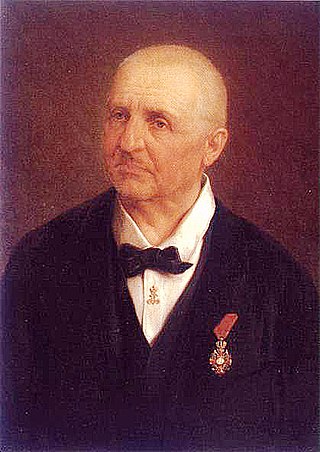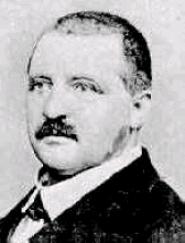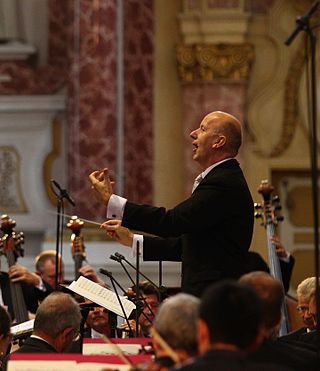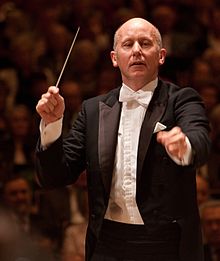
Anton Bruckner's Symphony No. 5 in B-flat major WAB 105, was written in 1875–1876, with minor changes over the next two years. It came at a time of trouble and disillusion for the composer: a lawsuit, from which he was exonerated, and a reduction in salary. Dedicated to Karl von Stremayr, education minister in the Austro-Hungarian Empire, the symphony has at times been nicknamed the "Tragic", the "Church of Faith" or the "Pizzicato"; Bruckner himself referred to it as the "Fantastic" without applying this or any other name formally.

Anton Bruckner's Symphony No. 7 in E major, WAB 107, is one of the composer's best-known symphonies. It was written between 1881 and 1883 and was revised in 1885. It is dedicated to Ludwig II of Bavaria. The premiere, given under Arthur Nikisch and the Gewandhaus Orchestra in the opera house at Leipzig on 30 December 1884, brought Bruckner the greatest success he had known in his life. The symphony is sometimes referred to as the "Lyric", though the appellation is not the composer's own, and is seldom used.

Anton Bruckner's Symphony No. 8 in C minor, WAB 108, is the last symphony the composer completed. It exists in two major versions of 1887 and 1890. It was premiered under conductor Hans Richter in 1892 at the Musikverein, Vienna. It is dedicated to the Emperor Franz Joseph I of Austria.

The Symphony No. 9 in D minor, WAB 109, is the last symphony on which Anton Bruckner worked, leaving the last movement incomplete at the time of his death in 1896; Bruckner dedicated it "to the beloved God". The symphony was premiered under Ferdinand Löwe in Vienna in 1903.

Anton Bruckner's Symphony No. 1 in C minor, WAB 101, was the first symphony the composer thought worthy of performing and bequeathing to the Austrian National Library. Chronologically it comes after the Study Symphony in F minor and before the "nullified" Symphony in D minor. The composer gave it the nickname Das kecke Beserl, and conducted its 1868 premiere. Much later, after Bruckner was granted an honorary University of Vienna doctorate in 1891, he dedicated the 1890–1891 version of the work to that institution.

Anton Bruckner's Symphony No. 2 in C minor, sometimes known as the "Symphony of Pauses", was completed in 1872. It was actually the fourth symphony composed by Bruckner, after the Symphony in F minor (1863), the Symphony No. 1 in C minor (1866), and the Symphony in D minor (1869).

Anton Bruckner's Symphony No. 3 in D minor, WAB 103, was dedicated to Richard Wagner and is sometimes known as his "Wagner Symphony". It was written in 1873, revised in 1877 and again in 1889.

Anton Bruckner's Symphony No. 4 in E-flat major, WAB 104, is one of the composer's most popular works. It was written in 1874 and revised several times through 1888. It was dedicated to Prince Konstantin of Hohenlohe-Schillingsfürst. It was premiered in 1881 by Hans Richter in Vienna to great acclaim.

Anton Bruckner's Symphony in F minor, WAB 99, was written in 1863, at the end of his study period in form and orchestration by Otto Kitzler.

The Mass No. 3 in F minor, WAB 28, is a setting of the mass ordinary for vocal soloists, chorus and orchestra, and organ ad libitum, that Anton Bruckner composed in 1867–1868.

Anton Bruckner's String Quintet in F major, WAB 112 was composed in 1878/79 in Vienna.

Psalm 146 in A major by Anton Bruckner is a psalm setting for double mixed choir, soloists and orchestra. It is a setting of verses 1 to 11 of a German version of Psalm 147, which is Psalm 146 in the Vulgata.

The Mass No. 1 in D minor, WAB 26 by Anton Bruckner, is a setting of the Mass ordinary for soloists, mixed choir and orchestra, and organ.

The Symphony in D minor, WAB 100, was composed by Anton Bruckner in 1869 between Symphony No. 1 (1866) and Symphony No. 2 (1872). In 1895 Bruckner declared that this symphony "gilt nicht" and he did not assign a number to it. The work was published and premiered in 1924.
There have been many different versions and editions of the symphonies of Anton Bruckner.
The Austrian composer Anton Bruckner composed eleven symphonies, the first, the Symphony in F minor in 1863, the last, the unfinished Ninth symphony from 1893 to 1896.

The Philharmonie Festiva is a festival orchestra founded by the conductor Gerd Schaller and became internationally recognized for its Bruckner recordings.

The Summer Music Festival at Ebrach in Franconia) was established in 1990 by Gerd Schaller, who conducts it and is its artistic director.
William Carragan, American musicologist, is particularly known for his research into the music of Anton Bruckner. His primary concerns are analytical aspects of the music, and history of Bruckner performance. He is a contributing editor of the Bruckner Collected Edition in Vienna, sponsored by the International Bruckner Society.
BRUCKNER2024 is a musical project by the conductor Gerd Schaller, the Philharmonie Festiva, the Bayerischer Rundfunk – Studio Franken, the CD label Profil Edition Günter Hänssler and the Ebrach Summer Music Festival with the aim of performing and releasing all versions of the symphonies of Anton Bruckner on CD by the 200th birthday of the composer Anton Bruckner, including the seldom intermediate variants.








